How Running Saved Mo Farah From UK's Modern-Day Slavery

- Oops!Something went wrong.Please try again later.
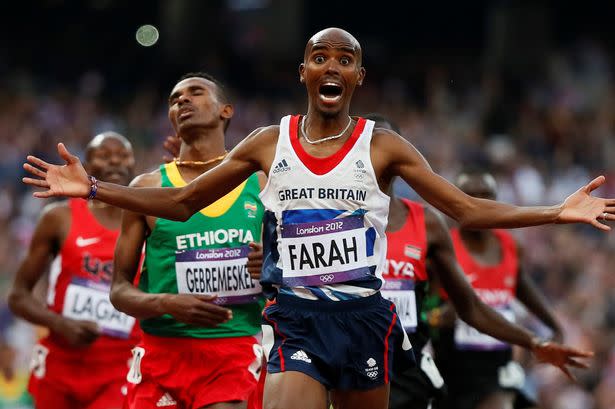
Long-distance Olympic runner Mo Farah has told the BBC that he was trafficked into the UK as a child and forced to work as a domestic servant. Previously when sharing his life story, Farah claims to migrate to the UK from Somalia with his parents as a refugee. But in a recent documentary by the BBC and Red Bull Studios, airing on Wednesday, the long-distance runner shares his parents have never been to the UK. His father was killed during the Civil War when he was 4 years old, and his mother has never left Somaliland.
The "Real" Mo
Farah says he was about eight or nine years old when he was taken from home to stay with family in Djibouti. His mother shares, “We were living in a place with nothing, no cattle, and destroyed land. We all thought we were dying. ‘Boom, boom, boom,’ was all we heard. I sent [him] away because of the war. I sent [him] off to [his] uncle in Djibouti so you could have something.”
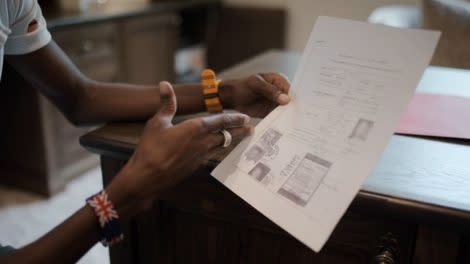
However, Farah never made it to his uncles. Instead, he was given the name of another child — Mohamed Farah — and fake travel documents with which he was flown to the UK by a woman he had never met. Once in the UK, the woman took him to her London home and told him to do housework including childcare “if I wanted food in my mouth.” Fear of never seeing his family again was instilled in him to keep him quiet.
For years, he was not allowed to go to school. The staff at the school were told Sir Mo was a refugee from Somalia. Teachers share with BBC that Farah came to school “unkempt and uncared for”, that he “spoke very little English” and was an “emotionally and culturally alienated” child.
Despite the negligence at home, Farah was different when he was in PE class. His PE teacher noticed a transformation in the young boy when he hit the track field. Farah shares with BBC, “the only thing I could do to get away from this [living situation] was to get out and run.”
He eventually confided in his PE teacher, Mr. Watkinson. He told his teacher everything about his true identity, and the family he was being forced to work for. That’s when Mr. Watkinson contacted social services and Farah was given to another Somali family to be fostered. Mr. Watkinson also helped him apply for British citizenship under the name Mohamed Farah, which was granted in July 2000. “I felt like a lot of stuff was lifted off my shoulders, and I felt like me. That’s when Mo came out – the real Mo.”
Legal Domestic Servitude in UK
Domestic servitude is one of the most prevalent forms of modern slavery in the UK and largely affects foreign domestic workers. Parliament has aided and abetted the exploitation and human trafficking of migrant domestic workers in the UK. Under the U.K Domestic Oversea Workers Visa, employers are allowed to bring “the help” with them, granting special work authorization to the servants they kept before moving to the UK. This law mirrors that of the Kafala System of the Gulf where “an individual’s right to work and legal presence is dependent on his or her employer.”
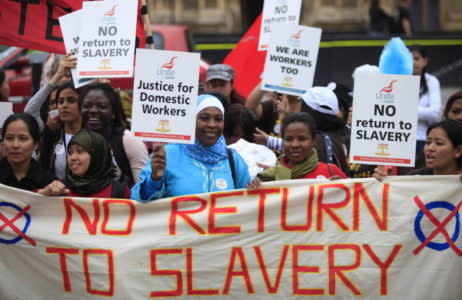
Under the ODW visa, migrant workers are entitled to human rights laws, and UK labor regulations, but instead they are kept in fear and isolation. Tactics used are passport confiscation, confinement to the home, physical and psychological abuse, long working hours with no rest days, and very low or non-payment of wages.
In 2012, this visa was amended to tie domestic workers’ legality in the UK to the employer with whom they arrived in the country. The change does not permit domestic workers to change employer and their residency status is only lawful for as long as the employer with whom they entered employed them, to a maximum of six months. The post-2012 visa does not allow for family reunification (i.e. for workers to bring dependent family members to join them) or provide a route to settlement.
This law still remains in force despite evidence that it facilitates abuse and exploitation. During the passing of the UK Modern Slavery Act 2015, supporters of domestic workers argued that if the government was committed to tackling labor exploitation, they should change the visa that made workers so vulnerable to exploitation. However, Since 2016, domestic workers only have gained the unconditional right to change employers WITHIN the six months of the duration of the visa, but without a right to extend the visa.
UK's ODW Visa in 2022
In April 2022, UK Labor Law published Trapped In Cycles Of Exploitation The Uk Overseas Domestic Worker Visa 10 Years On which looked at the effects of the 2012 amendment to the ODW visa on migrant workers. Since 2016, there are still very limited exceptions for workers to extend their visas beyond the initial six-month period. This option only applies to victims of human trafficking or modern slavery. Domestic workers who do not meet the qualifications to be considered a victim of human trafficking become undocumented and face the policies collectively termed the ‘hostile environment.” These systemic and socially imposed measures aim to make life in the UK unviable for those with irregular immigration status by preventing access to decent work, housing, healthcare, education, and family life.
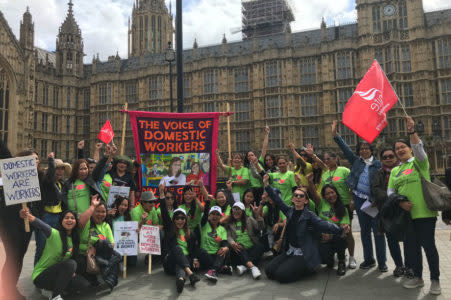
A failing visa system, limited extension possibilities, and the ‘hostile environment’ make domestic workers reluctant to use the 2016 visa amendment and leave their employer out for fear of deportation. The ‘protection gap’ that the current policies create means workers who suffer labor law violations but do not meet the criteria to be recognized as survivors of trafficking are left without protection.
Hope In Mo Farah's Confessions
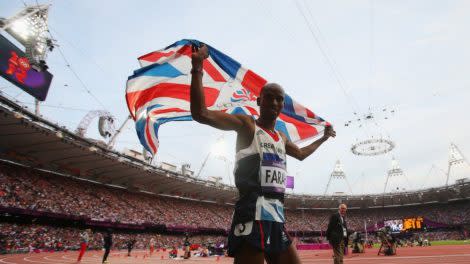
The documentary The Real Mo Farah will air on July 13th. Farah shares with BBC that trying to teach his kids honesty motivated him to tell his story. “I had no idea there were so many people who are going through exactly the same thing that I did. It just shows how lucky I was,” he says. Farah hopes that his story “challenges public perceptions of trafficking and slavery.”
“What really saved me, what made me different, was that I could run.”

